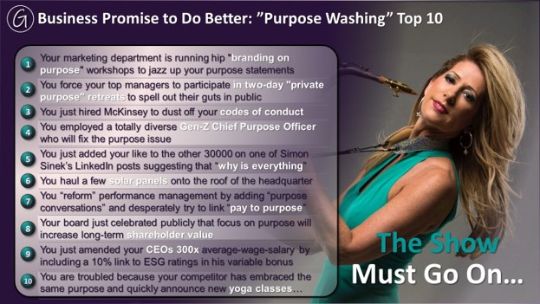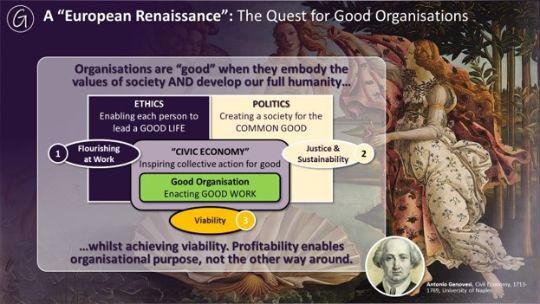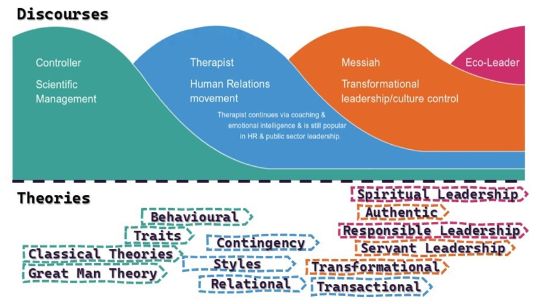
Business schools these days are struggling to find their way. They often appear lost in their desire to foster a positive image of business and cling to an educational ideal of highly scientific and technical craftmanship (case studies, anyone?!), whilst seeking to adapt to the increasing criticism of both alumni and public. Yet, I fear a lot more needs to be done to step up the game.

Business schools these days are struggling to find their way. They often appear lost in their desire to foster a positive image of business and cling to an educational ideal of highly scientific and technical craftmanship (case studies, anyone?!), whilst seeking to adapt to the increasing criticism of both alumni and public. Yet, I fear a lot more needs to be done to step up the game.
Recently, I was invited by a top-tier b-school to participate in a session with a well-known CEO and entrepreneur. I decided to join because the individual had an interesting reputation — he had been exceedingly successful in business transformation and restructuring, whilst also earning a rather ambiguous reputation for aggressively reducing costs and laying off employees.
Now anyone in transformation or turnaround knows that often tough decisions are required. It is the responsibility of leaders in charge to protect the business as a whole, as a going concern — which might imply letting go of parts, or holding people to account when not achieving their objectives. This is hard. I always found it very difficult to let people go, especially when troubles were caused by external forces. Over time, however, I learned that we must be — and can be — as decent, respectful and caring when things end, as when things begin. Character simply isn’t a question of bottom line.
Yet, the entrepreneur at that session continued to tell a story of maximising cash flows, investor returns, rising share prices, command and control — constantly referring to people as “costs”, disdaining the “touchy feely stuff”, and oblivious of a wider stakeholder perspective. Granted he was a multi-millionaire and might have felt he got things right — but the presentation at the business school flowed on completely uncritically. The overcrowded lecture theatre listened in awe to the “marvellous” insights of an, allegedly, hugely successful leader. “A stellar CV”, the hosting professor suggested…
Friends and colleagues, that ain’t good enough! We’re perpetuating an anachronistic, masculine, uncaring leadership ideology and idolise the immature and unworthy exemplars of its creed. In the 21st century, frankly, I’m expecting better. If nothing else, business schools must educate students to practice critical inquiry and ask the tough questions, not coach them to be blinded by merely financial success. We are what we value — and that must be more than a balance sheet!!
Business schools these days are struggling to find their way. They often appear lost in their desire to foster a positive image of business and cling to an educational ideal of highly scientific and technical craftmanship (case studies, anyone?!), whilst seeking to adapt to the increasing criticism of both alumni and public. Yet, I fear a lot more needs to be done to step up the game.
Recently, I was invited by a top-tier b-school to participate in a session with a well-known CEO and entrepreneur. I decided to join because the individual had an interesting reputation — he had been exceedingly successful in business transformation and restructuring, whilst also earning a rather ambiguous reputation for aggressively reducing costs and laying off employees.
Now anyone in transformation or turnaround knows that often tough decisions are required. It is the responsibility of leaders in charge to protect the business as a whole, as a going concern — which might imply letting go of parts, or holding people to account when not achieving their objectives. This is hard. I always found it very difficult to let people go, especially when troubles were caused by external forces. Over time, however, I learned that we must be — and can be — as decent, respectful and caring when things end, as when things begin. Character simply isn’t a question of bottom line.
Yet, the entrepreneur at that session continued to tell a story of maximising cash flows, investor returns, rising share prices, command and control — constantly referring to people as “costs”, disdaining the “touchy feely stuff”, and oblivious of a wider stakeholder perspective. Granted he was a multi-millionaire and might have felt he got things right — but the presentation at the business school flowed on completely uncritically. The overcrowded lecture theatre listened in awe to the “marvellous” insights of an, allegedly, hugely successful leader. “A stellar CV”, the hosting professor suggested…
Friends and colleagues, that ain’t good enough! We’re perpetuating an anachronistic, masculine, uncaring leadership ideology and idolise the immature and unworthy exemplars of its creed. In the 21st century, frankly, I’m expecting better. If nothing else, business schools must educate students to practice critical inquiry and ask the tough questions, not coach them to be blinded by merely financial success. We are what we value — and that must be more than a balance sheet!!
Other popular articles in the KnowledgeHub: Business Transformation




 .
.